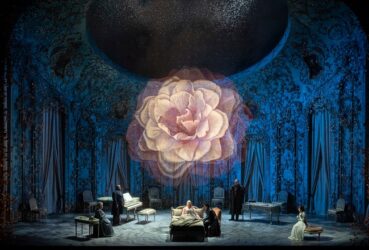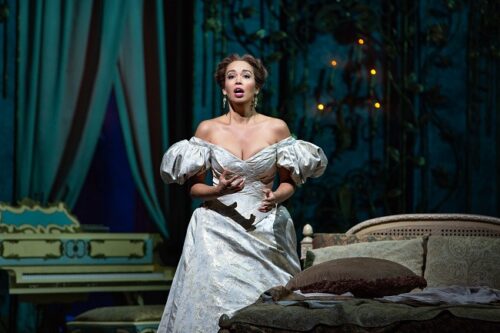 United States The Met: Live in HD – Verdi, La traviata: Soloists, Chorus and Orchestra of the Metropolitan Opera, New York / Daniele Callegari (conductor). Broadcast live to Cineworld Basildon, Essex, 5.11.2022. (JPr)
United States The Met: Live in HD – Verdi, La traviata: Soloists, Chorus and Orchestra of the Metropolitan Opera, New York / Daniele Callegari (conductor). Broadcast live to Cineworld Basildon, Essex, 5.11.2022. (JPr)

Production:
Production – Michael Mayer
Revival Stage director – Sarah Ina Meyers
Set designer – Christine Jones
Costume designer – Susan Hilferty
Lighting designer – Kevin Adams
Choreographer – Lorin Latarro
Cast:
Violetta Valéry – Nadine Sierra
Alfredo Germont – Stephen Costello
Giorgio Germont – Luca Salsi
Flora – Siphokazi Molteno
Gastone – Jonah Hoskins
Baron Douphol – Brian Major
Marquis D’Obigny – Jeongcheol Cha
Dr Grenvil – Paul Corona
Annina – Eve Gigliotti
Giuseppe – Patrick Miller
Messenger – Jonathan Scott
Germont’s daughter – Allegra Herman
Live in HD director – Gary Halvorson
Live in HD host – Renée Fleming
Though I will revisit some of my review when I saw Michael Mayer’s La traviata when it was first put on in 2018, I have altered the initial (rather low) opinion I had of it then. Obviously, the sets and costumes remain constant, but it is possible that in its subsequent major 2020 revival or for this one there have been changes in the Personregie because the cast acted with such dramatic credibility.
La traviata is the near-perfect opera vehicle for three singing ‘stars’ – which it definitely gets here in Nadine Sierra, Stephen Costello and Luca Salsi – and if given them audiences will come time and again to hear it. Sometimes opera companies get the urge to experiment but often need a La traviata – as much as La bohème – that can return year after year as a box office banker. Verdi wrote his finest operas in two periods of his life – the middle years produced Rigoletto, Il trovatore and La traviata, and his last ones brought us Aida, Otello and Falstaff. He was at the height of his powers when he composed La traviata for Teatro La Fenice, Venice, in 1853 and the dramatic structure of the opera is almost perfect with few of the longueurs some of his works can have. Act I of course, recounts the consumptive courtesan Violetta’s attraction for the penniless aristocrat Alfredo Germont; Act II shows us the confrontation between Violetta and Alfredo’s father who demands she give up the scandalous liaison with his son; followed by Alfredo denouncing Violetta at Flora’s party – that is initially held up by some gypsies and bullfighting nonsense – and the last act has their reconciliation before Violetta’s sad death from TB (kudos here for Nadine Sierra’s effective wheezing).
I originally accused this La traviata of being ‘Disneyfied’ and indeed Mayer has brought something of Broadway to it and Christine Jones’s basic single set does reminds you of a Disney musical, Beauty and the Beast perhaps? I appreciate how Violetta lives in splendidly ornate and gilded surroundings, part-salon and part-bedroom, worthy of Versailles and everyone we see is sumptuously costumed. A large bed is ever-present centrally during the three acts and during the Prelude (which pays homage to that for Wagner’s Lohengrin) we see Violetta’s soul rising from her deathbed as snow gently falls: we are supposed to understand what we subsequently see is her life ‘flashing before her eyes’. In this Live in HD broadcast full of interesting interviews and backstage insights we heard from set designer Jones and costume designer Susan Hilferty how across Mayer’s production we seen four seasons with costumes and matching lighting (from Kevin Adams). There is the winter of her death (Act III), spring shown by the snow changing into falling petals for the first act and during Act II there is summer for the scene with Alfredo’s father and autumn for Flora’s party. The bed is pivotal to what we see and, for instance, in the second act Violetta is sleeping in it as Alfredo – who is usually shown alone – sings ‘De’ miei bollenti spiriti’. Even in the first act Baron Douphol (Brian Major) has lounged suggestively on it before being dismissed by Violetta.
This time the gymnastic Act II gypsies and matadors made sense and I could understand it now – in the context of Mayer’s Konzept of Violetta reliving her past life in spirit – as the representation of the Latin American Dia de los Muertos (Day of the Dead). The major novelty the director brings to an otherwise fairly traditional La traviata is when Alfredo’s strait-laced father, Germont, presents the young daughter we hear sung about to Violetta in the second act. Her engagement has been tainted by her brother’s association with someone with such a dubious reputation. The role here of the daughter – not found in Verdi’s original libretto – is a silent one and she will also ‘haunt’ Violetta’s death in the final act.

Nadine Sierra is almost as remarkable offstage as on and is remarkably personable when interviewed though I was surprised when she spoke to Renée Fleming – a fine Violetta herself – that she didn’t suggest she was one of her ‘inspirations’ in the role and only named Italian soprano Mariella Devia. Even accepting I was listening through cinema loudspeakers; Sierra’s Violetta (a role debut) was as remarkable as her recent Lucia at the Met (review here). We constantly heard said how the soprano singing Violetta needs three voices, coloratura (Act I), more lyrical (Act II) and more dramatic and expressive (Act III); that is what Sierra’s one voice is capable of and there are no vocal gear changes. Her whole performance was a highlight from as suitably sparkling ‘È strano! … Ah, fors’è lui’ and ‘Sempre libera’ (culminating in the optional E-flat) to her deeply affecting farewell (‘Gran Dio!…morir sì giovane’).
Stephen Costello is not that much older than Sierra but looked slightly too old for Alfredo. He has a dark, somewhat baritonal tenor, though with some appealing intrinsic beauty and suitable spinto power. To his credit Costello tried to be as youthfully impetuousness and smoulderingly jealous as Alfredo needs to be, and while I was not certain of the chemistry between him and Sierra’s Violetta at the start, I was more convinced by the end of the opera. As his father Germont, Luca Salsi was an imposing presence on stage and despite his stentorian baritone voice his ‘Di Provenza il mar’ sounded particularly heartfelt. With his father so quick to anger and threatening to hit Alfredo one worried if there had been violence in his upbringing.
The wonderful Met chorus played a spirited part in their two party scenes and this La traviata was cast from strength with an ensemble making the most of even the smallest roles; notably catching the eye and ear were Siphokazi Molteno’s Flora, Brian Major’s Baron and Eve Gigliotti’s Annina. Daniele Callegari conducted with sensitivity, authority, passion and a fine sense for keeping the drama moving forward, whilst coaxing a typically first-class account of Verdi’s heart-rending score from the Met Orchestra.
Jim Pritchard

Fantastic Nadine Sierra, Costello and Salsi, what a combination in this production, singing acting and presence, photographed beautifully in HD for the cinema its nearly a perfect one stage combo for the whole opera, i.e. minimal stage shifts, the real magic comes in the lighting and dressing of the stage, Metropolitan Opera and their chorus, bring crisp, fire and intensity to the score, with and interesting ballet or movement sequence, host Renée Fleming seems a bit abrupt and wants to get the interviews done as soon as possible to talk about her Hours gig with Yannick later on in December, bless, a super afternoon at the cinema, with some absolute incredible singing all round and great cameos from the supporting cast and another South Korean baritone, breakout, scrumptious!
Just seen this production in Live in HD in South Africa – I thought the set and costumes were pretty awful, the baritone was ‘meh, umm’ and the tenor seriously needs some lessons in acting and not yelling practically everything…
however …
Nadine Sierra was SUPERB, possibly the best Violetta I have ever heard or seen, brought tears to my eyes in the last act, and the whole cinema audience seemed to feel the same way.
Just seen this in Jo’burg. Screening not helped by load shedding glitches. Bring back the Willie Decker production … this one is too florid and visually confused.
I grieve for Dmitri Hvorostovsky’s memorable stillness and heart. Really did not enjoy this casting, although possibly more engaged than premiere season.